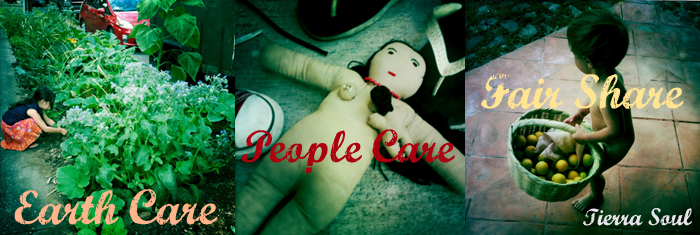
Permaculture Ethics
March 15, 2015
One of the first things to know about Permaculture that makes it different from other paradigms of ecological and social reform is that it is rooted in 3 basic permaculture ethics. These 3 ethics form the foundation of what makes permaculture so unique. For example organic agriculture simply requires that one not use synthetic pesticides. Of course this requirement stems from a fundamental ethic – that natural systems are safer and superior to synthetic ones, but it does nothing to limit crop size, mono-cropping or overuse of natural pesticides. Much of organic agriculture functions according to the letter of the law with respect to natural pesticides, but doesn’t consider much else.
The 3 permaculture ethics ground it (and its 12 principles guide it) so that at any time there are at least 3 perspectives to consider.
Permaculture Ethics: Earth Care
Earth Care suggests that whenever we come up with an idea for a product or project we need to consider if it honors the basic needs of the earth in its presence and production as well as its demise. The earth needs us as much as we need her.
One day when I was laying on the ground listening to what the earth might have to say to me, I heard her speak. She said, “Lay down in my lap and I will take away your pain. I need your pain. It feeds me. Like a mother with her babe in arms, I must consume your pain. Without it I starve and my nourishment is wasted.”
We must be careful not to assume what is best for the earth. we must ask her, and wait for her reply.
Permaculture Ethics: People Care
People care is also a very important ethic in Permaculture. Dominant Western culture also espouses this ethic, but without the other 2 ethics it has led to disaster. However, when taken together with People Care and Fair Share (hold on, it’s coming!) it finds its balance, its limits, its purpose. I want to share one of my favorite quotes: “We must carry each other. If we don’t have this, what are we.” ~ Anne Michaels, Fugitive Pieces.
Self Care is the foundation of People Care. Unless we care for ourselves and our fundamental needs we will not be effective in our care of others. People live in community and also in solitude. We must care for both.
Permaculture Ethics: Fair Share
Fair Share is the final permaculture ethic that provides the ultimate and beautiful limit on human freedom and anchors Permaculture in its deep and profound altruism. Fair share is more than a global political need – the feeding of the poor in Africa or India or Mexico or in your own neighborhood. It is about surplus of any kind that we find ourselves with and our responsibility to share it rather than save, store or hoard it. Regardless of our economic lot in life resources do not belong to us, but to all. Our job is merely to serve and to share.
These 3 permaculture ethics work together. For example, when one has surplus it can feel hard to give it away rather than save it or sell it. This is when we need to turn to people care, in particular self-care, and heal the wound and imprint of capitalist greed even in its small expression in our individual lives. We may appeal to the earth for guidance and support as well.
Don’t believe the earth speaks?
Well, don’t trust me. Lay down and ask her yourself.